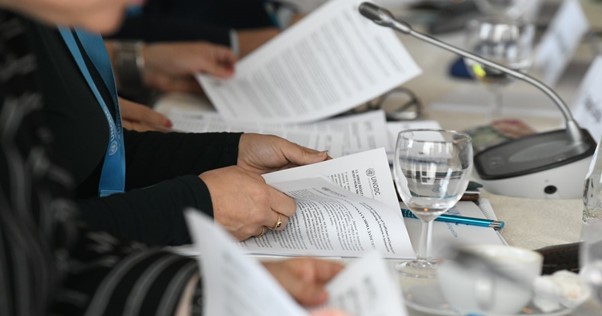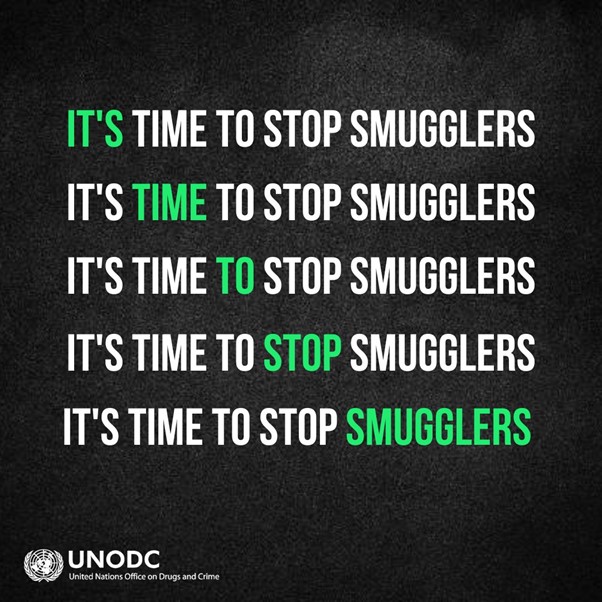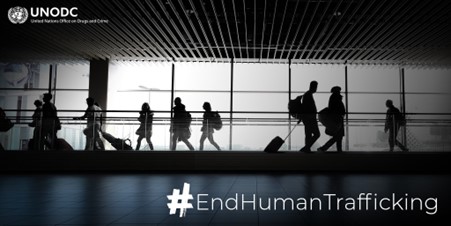REGIONAL: FIGHT HUMAN TRAFFICKING AND MIGRANT SMUGGLING IN SOUTH-EASTERN EUROPE
The Human Trafficking and Migrant Smuggling Section of the United Nations Office on Drugs and Crime (UNODC) launched the 2023 annual report, highlighting its main achievements over the past year, including dismantling criminal enterprises that trade in people and their hopes, convicting perpetrators and providing support and protection to victims and people in vulnerable situations. The UNODC annual report on human trafficking and migrant smuggling have been published in the UNODC website.
The report highlights that Human Trafficking and Migrant Smuggling are global crimes that use people, women and children in particular, for profit. The criminal networks or individuals behind these lucrative crimes take advantage of people who are in vulnerable situations, desperate to flee conflict and war or simply seeking a better life.
The UNODC strives for the eradication of these crimes through the dismantling of the criminal enterprises that trade in people and their hopes, the conviction of the main perpetrators and the support and protection of victims and people in vulnerable situations. Ultimately, our work safeguards people from the abuse, neglect, exploitation or even death that is associated with human trafficking and migrant smuggling.

In 2023, the UNODC Regional Programme for South-Eastern Europe and the UNODC Human Trafficking and Migrant Smuggling common Action trained 255 law enforcement officials, prosecutors and judges from Moldova, Serbia, Montenegro, North Macedonia, and Albania as part of the UN.Locking Impunity of Traffickers and Supporting Justice for Victims of Trafficking in Persons in Southeastern Europe project. The project, which is funded by the US Department of State's Office to Monitor and Combat Trafficking in Persons, seeks to secure justice for victims of human trafficking in the region and train criminal justice professionals to strengthen responses and reinforce measures to protect victims of this crime. While legislative and institutional frameworks on addressing human trafficking are in place and in line with international standards in the region, there are gaps in their adequate implementation and operationalization. In many cases, these challenges result from the lack of ability of first responders and experts to identify instances of this crime, distinguish them from other offences, apply victim-centred approaches, and substantiate cases by collecting adequate evidence. Officials who attended the UNODC training reported their involvement in more than 100 investigations and prosecutions of human trafficking cases. They also identified over 90 victims.
Furthermore, migrant smuggling and human trafficking are highly lucrative businesses that treat people as commodities. UNODC’s “Study on Illicit Financial Flows Associated with Smuggling of Migrants and Trafficking in Persons” sheds light on illicit financial flows generated by these crimes, including payments, expenses and other revenues. The study – conducted under the Global Action against Trafficking in Persons and the Smuggling of Migrants (GLO.ACT), a UNODC project funded by the European Union and implemented in partnership with the International Organization for Migration (IOM) – focuses on the cross-border movement of money from several countries in Asia and the Middle East to Europe. The study shows that highly organized criminal groups, as opposed to individuals and small criminal networks, make the highest financial gains from the two crimes. In migrant smuggling, payments are usually made for transportation, accommodation, fraudulent work permits, passports and visas. In human trafficking, illicit financial flows derive from the recruitment and control of the victims, as well as their exploitation. For example, reported cases reveal that trafficked girls and women were sold for as little as 36 USD and as much as 23,600 USD. The study found that criminal networks frequently use payment and transfer methods that are not easily traceable by the authorities. While money transfer service providers and banking institutions are used, the more common methods are direct cash payments and use of the hawala – a money or value transfer system in which money is transferred without any actual movement of cash but rather through transactions between hawala brokers, who operate on a system of trust. While it is overwhelmingly used for legitimate purposes, some of its attributes make it vulnerable to use by organized crime groups, including smugglers and traffickers. In some cases, illicit finances are registered as legal income of legitimate businesses and are processed and transferred together with legal funds. The study shows that the illicit income made by smugglers and traffickers is largely spent in one of three ways: sent back to the country of origin, used to support a lavish lifestyle or registered as legal income of legitimate businesses.
...........
